Hospice Care Educational Webinars
July 25, 2025
Empowering Hospice Professionals Through Continuing Education

Enhancing Compassionate End-of-Life Care with Expert-Led Webinars
Hospice care is a vital component of healthcare that requires ongoing education and training for professionals to deliver compassionate, effective, and evidence-based services. In response to this need, numerous organizations offer comprehensive webinars, courses, and multimedia resources designed to improve practices, update knowledge, and meet regulatory requirements. This article explores the broad landscape of hospice care educational webinars, highlighting key offerings, topics, and the benefits they provide to healthcare providers, caregivers, and stakeholders.
A Wide Spectrum of Educational Resources and Training Programs
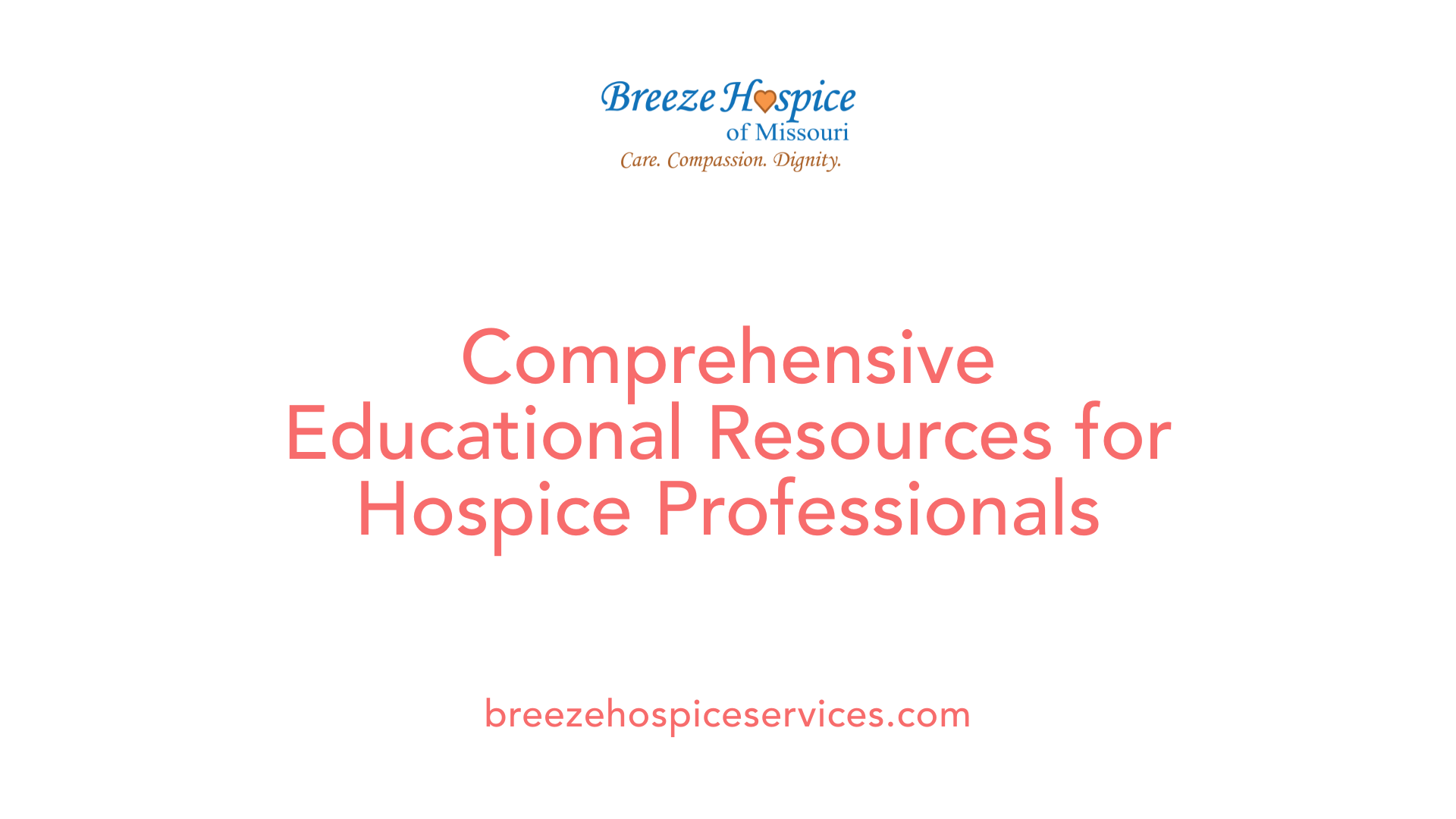 Hospice and palliative care professionals have access to a diverse array of educational resources and training options designed to improve practice and patient care.
Hospice and palliative care professionals have access to a diverse array of educational resources and training options designed to improve practice and patient care.
The MJHS Institute offers over 150 webinars, available both live and on-demand, covering topics such as hospice leadership, volunteer management, symptom control, and policy updates. These webinars provide continuing education credits (CME, CE, CCM) for nurses, social workers, case managers, and other healthcare professionals. The institute also features multimedia modules on subjects like developing community-based programs and sensibly caring for Holocaust survivors at end of life, with up to 9.75 credits available.
In addition to webinars, numerous professional factsheets and patient education handouts are downloadable for free. These materials come in multiple languages and cover 18 topics, helping families and care teams understand complex issues in hospice care.
Specialized training extends to billing, social determinants of health, and health equity. For example, organizations like the Alliance for Care at Home and Care Dimensions offer targeted webinars on navigating regulations, supporting underserved populations, and implementing best practices in grief counseling and care transitions.
Furthermore, upcoming courses explore critical topics such as creating inclusive bereavement groups, virtual reality use in hospice settings, and medication deprescribing at end of life. These offerings are frequently accredited, allowing participants to earn additional certification and demonstrate their expertise.
Many sites also provide virtual office hours, expert consultations, and leadership development programs to foster continuous professional growth. Overall, the extensive range of online courses, multimedia content, and certification initiatives aims to elevate skills, improve patient outcomes, and support healthcare teams in providing compassionate hospice and palliative care.
| Resource Type | Description | Notable Features |
|---|---|---|
| Webinars | Live and on-demand sessions | CME, CE, CCM credits; topics include leadership, policy, symptom management |
| Multimedia Modules | Interactive online training | Community program development, sensitive end-of-life care |
| Downloadable Factsheets | Educational handouts | Multiple languages, patient-oriented, professional use |
| Specialized Training | Billing, social determinants, health equity | Focused sessions for practice improvement |
| Additional Programs | Office hours, leadership coaching | Ongoing professional development |
Key Topics in Hospice and Palliative Care Webinars
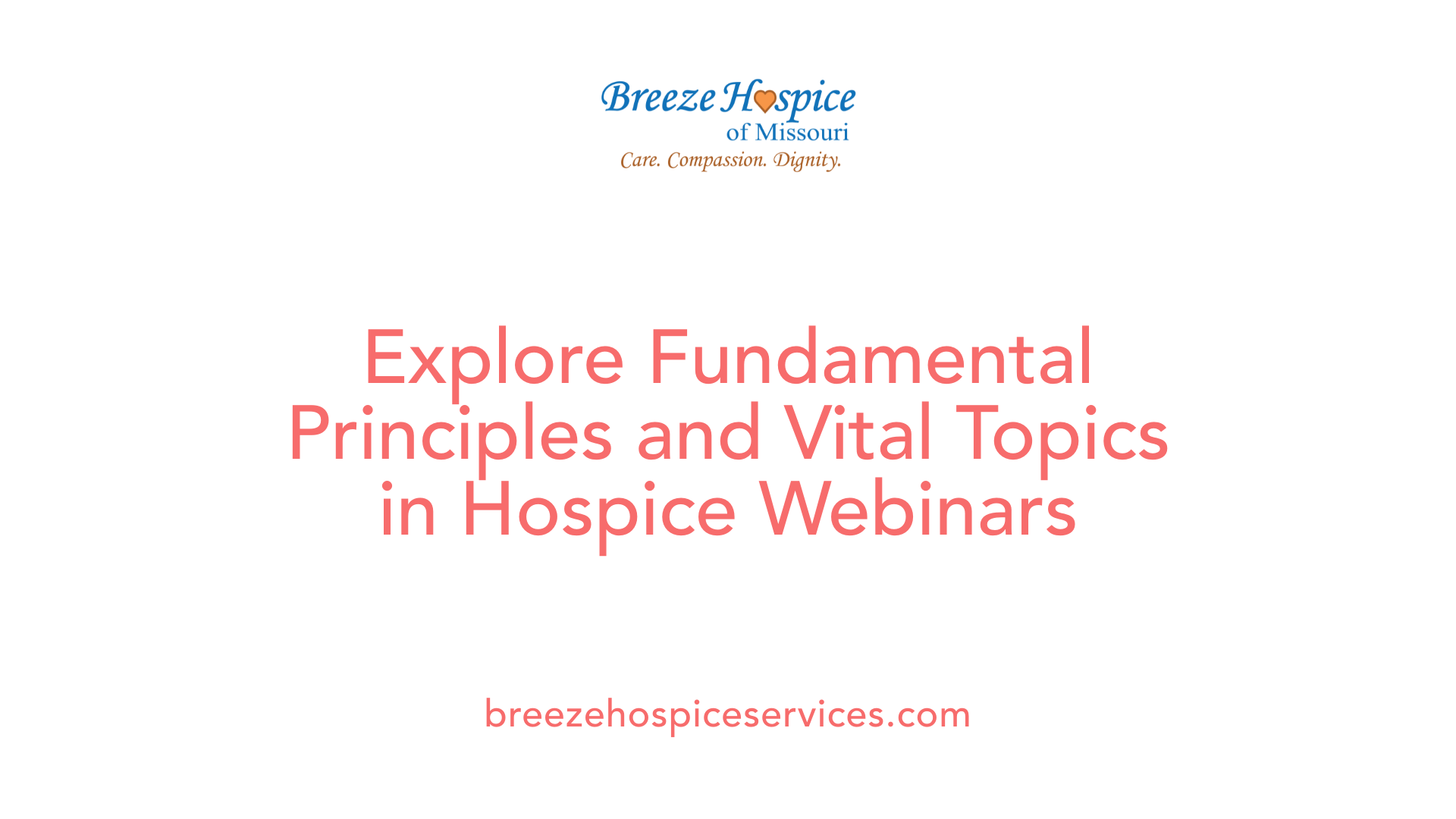
What are the three C's of hospice care?
The three C's—Compassion, Comfort, and Communication—are fundamental principles emphasized in hospice and palliative care webinars. Compassion highlights the importance of emotional support and empathy from healthcare providers. Comfort focuses on relieving pain and physical distress to improve quality of life. Communication involves transparent and ongoing dialogue with patients, families, and care teams to ensure everyone is informed and involved.
These topics are covered extensively in a variety of webinars offered by organizations like the MJHS Institute, Care Dimensions, and Kōkua Mau. These sessions are designed to improve skills, enhance patient care, and support care providers across different settings.
What are some of the main subjects addressed?
Webinars explore several vital topics, including symptom management, advance care planning, bereavement and grief support, volunteer management, and how to coordinate care across different healthcare environments.
Symptom Management focuses on controlling pain, nausea, dyspnea, and other symptoms commonly experienced by hospice patients. Best practices and evidence-based approaches are regularly discussed to ensure comfort and dignity.
Advance Care Planning involves guiding patients and families through discussions about their future health care preferences, legal documents like advance directives, and end-of-life wishes.
Bereavement and Grief Support provide caregivers and family members with strategies for coping with loss. Upcoming courses like 'Creating Successful and Inclusive Bereavement Groups' and 'Best Practices in Grief Counseling' ensure professionals are prepared to offer compassionate support.
Volunteer Management training helps organizations optimize volunteer involvement, which is crucial for holistic hospice care. Topics include recruiting, training, and integrating volunteers into care teams.
Coordinating Care Across Settings emphasizes seamless transitions between hospital, home, and long-term care facilities, ensuring continuity and quality of care for patients.
Upcoming and on-demand education opportunities
Several reputable organizations offer ongoing webinars, many accredited for Continuing Education Credits (CEUs). For example, Care Dimensions and VITAS Healthcare host monthly sessions covering topics like hospice myths, care transitions, and the use of virtual reality in bereavement.
An example of upcoming webinars includes engaging topics such as 'Addressing Common Hospice Regulatory Questions' and 'Food as Ritual in Grief'. These programs allow professionals to stay current with changes in policy, practice, and innovative care strategies.
Comparing educational platforms
| Organization | Content Focus | Certification & Credits | Accessibility |
|---|---|---|---|
| MJHS Institute | Multimedia modules, live and on-demand webinars on hospice topics | up to 9.75 CE credits | Online, downloadable content, multi-language materials |
| Care Dimensions | Series of free webinars, extensive topics on hospice and palliative care | CEUs for nurses, social workers, case managers | Virtual live sessions, recordings available |
| VITAS Healthcare | Expert-led webinars, focus on clinical topics, approved for various professionals | Continuing Education Credits | Scheduled, online, post-event access |
| Alliance for Care at Home | Home care & hospice professional development, webinars and toolkits | Member access to resources | Interactive online platform |
Through these resources, hospice and palliative care professionals can deepen their understanding, stay updated on regulations, and improve patient support strategies.
Current Educational Offerings and Accreditation
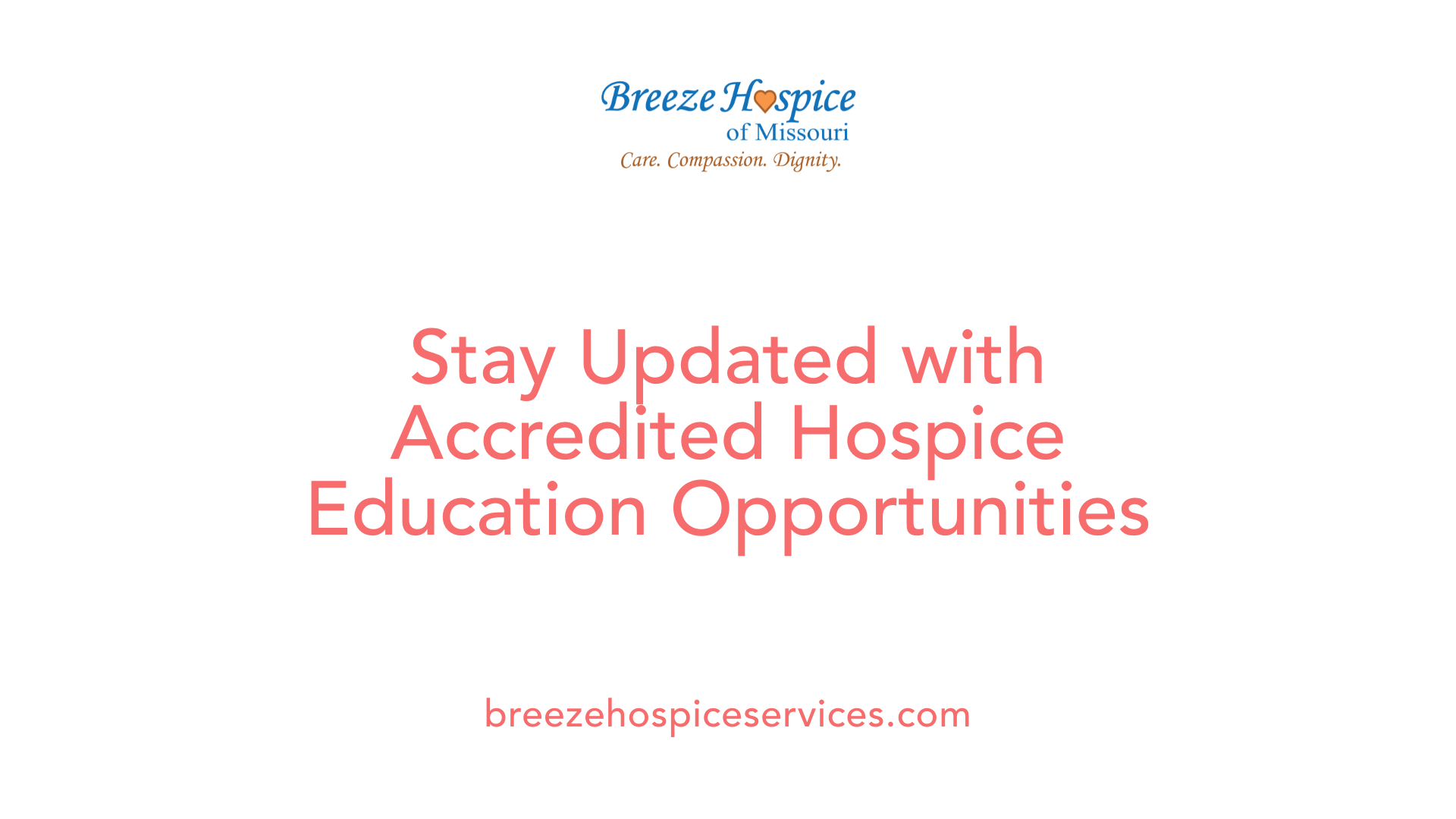
What are the four levels of hospice care?
Hospice care is structured into four distinct levels, as outlined by Medicare. These levels are designed to address varying patient needs and circumstances.
- Routine Home Care: This is the most common form of hospice care. It focuses on providing comfort and symptom management for patients at home. The patient receives regular visits from hospice staff to ensure quality end-of-life care.
- Continuous Home Care: Also known as crisis care, this level provides intensive nursing support around the clock during medical emergencies. It aims to control symptoms and stabilize the patient in their home environment.
- General Inpatient Care: When symptoms cannot be effectively managed at home, patients may be admitted to hospitals or skilled nursing facilities. The goal here is to provide specialized care to stabilize the patient's condition.
- Respite Care: Offering short-term inpatient stays, respite care provides caregivers a temporary break while ensuring the patient continues to receive necessary care. This level supports both the patient and the caregiving team.
Overview of Educational Offerings
The MJHS Institute and other organizations like VITAS Healthcare and Care Dimensions provide extensive educational resources, including live and on-demand webinars, to strengthen hospice and palliative care practices. These webinars are suitable for professionals such as nurses, social workers, and case managers, and they often count toward continuing education (CE) credits.
- Expert-Led Presentations: Sessions feature industry experts covering a wide range of topics, from volunteer management and policy updates to care tools like the HOPE Tool series.
- Credit Opportunities: Participants can earn CE credits—up to 9.75 through multimedia modules and webinars. Credits are available for various healthcare professionals depending on the webinar topic.
- Diverse Topics: Topics include hospice leadership, advance care planning, grief support, medication management, and specialized care for underserved populations.
Relevant Webinar Series
Upcoming webinars are scheduled on topics such as creating inclusive bereavement groups, addressing hospice regulatory questions, and exploring innovative care methods like virtual reality. Past webinars have covered crucial areas such as hospice billing, HIPAA compliance, prognostication, and program development.
Credibility and Partnerships
These educational offerings are provided by highly regarded organizations such as the MJHS Institute, the Hospice Foundation, and Care Dimensions. Many webinars are approved for CE credits and are led by recognized healthcare experts, ensuring reliable and current information. With a focus on improving hospice care quality and compliance, these programs support professionals nationwide in staying current with industry standards.
Upcoming Webinars and Future Learning Opportunities
What are some upcoming webinars on hospice and palliative care?
The MJHS Institute regularly schedules webinars that cover a broad spectrum of topics relevant to hospice professionals. Notable upcoming sessions include discussions on creating inclusive bereavement groups for underserved populations, addressing common hospice regulatory questions from admission through bereavement, and exploring innovative end-of-life practices like deprescribing medications and using virtual reality in hospice care.
For those interested in enhancing their leadership skills, webinars such as 'Empowering Hospice Leadership' and the use of tools like the HOPE Tool are available. Additionally, topics like advance care planning and the use of new technologies are regularly covered to keep practitioners informed.
Other educational events focus on specialized topics, including food rituals in grief, best practices for grief counseling, and managing complex cases involving dementia or cultural considerations.
Topics such as hospice leadership, virtual reality in hospice, and grief counseling
These sessions aim to improve clinical skills, understanding, and compassionate care. For example, the webinar 'The Use of Virtual Reality in Hospice Care and Bereavement' explores how immersive technology can help patients and families cope with grief, providing a new dimension to support services.
Similarly, the 'Creating Successful and Inclusive Bereavement Groups for the Underserved' course aims to equip providers with strategies to ensure equitable support for all communities. Another focused webinar, 'Best Practices in Grief Counseling,' offers practical approaches for helping patients and families navigate sorrow.
What is the Netflix movie about hospice care?
The Netflix documentary 'End Game' offers a profound look into the experiences of individuals nearing the end of life. It features personal stories of patients with serious illnesses like interstitial lung disease (ILD), highlighting their interactions with healthcare teams dedicated to providing dignified and compassionate care.
The film emphasizes the importance of understanding symptoms such as changes in breathing, skin color, and energy levels, which are essential for ensuring comfort at the end of life. It underscores that each person's journey is unique and showcases the vital role of hospice in supporting dignity in the final stages.
How can this information help professionals and families?
Staying updated with upcoming webinars and training opportunities enables healthcare providers to refine their skills and incorporate the latest practices. For families and caregivers, accessing resources like the 'End Game' documentary can foster understanding and preparedness for the end-of-life experience. The ongoing education efforts aim to improve the quality of care and ensure that every individual receives respectful and tailored support during their final days.
Broader Impact and Community Engagement in Hospice Education
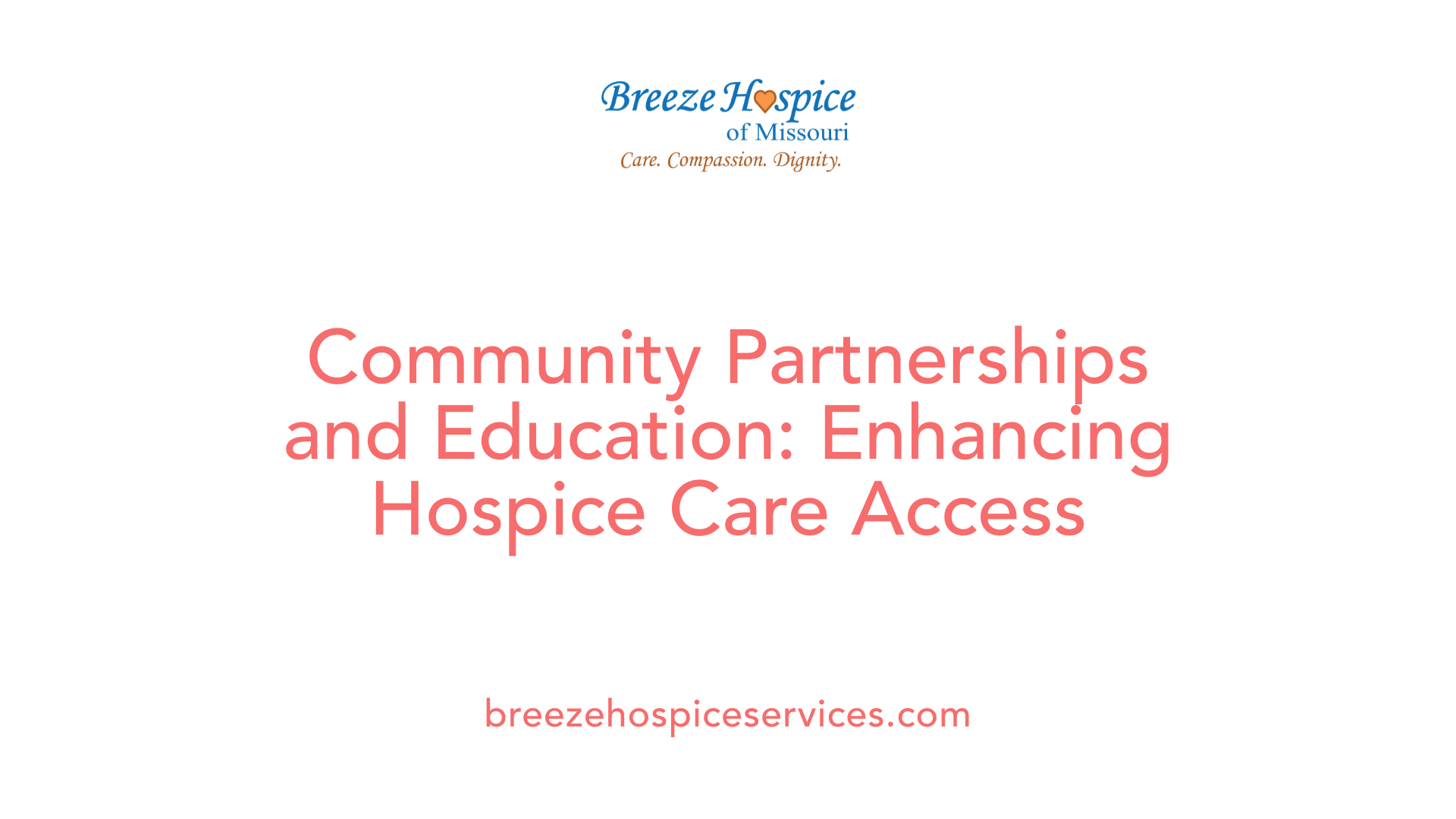 The MJHS Institute and other organizations like Care Dimensions and Kōkua Mau actively promote community engagement in hospice and palliative care education. They partner with local community organizations to extend educational resources, ensuring that patients, families, and caregivers gain critical knowledge about end-of-life options. These collaborations often include outreach programs, community seminars, and free webinars tailored to diverse populations.
The MJHS Institute and other organizations like Care Dimensions and Kōkua Mau actively promote community engagement in hospice and palliative care education. They partner with local community organizations to extend educational resources, ensuring that patients, families, and caregivers gain critical knowledge about end-of-life options. These collaborations often include outreach programs, community seminars, and free webinars tailored to diverse populations.
Patient and family education is a centerpiece of these initiatives. Free materials such as factsheets and handouts in multiple languages help families understand hospice services, advance care planning, and grief support. These resources empower individuals to make informed decisions and navigate complex emotional and medical landscapes.
Policy updates and advocacy also play a vital role. Regular webinars and news updates inform professionals and the public about changes in hospice regulations, Medicare policies, and legal considerations. By promoting awareness and understanding of policy shifts, these educational efforts support advocacy for policies that enhance access, quality, and affordability of hospice care.
Overall, these community-centered educational activities strengthen the fabric of hospice care through partnership, knowledge sharing, and advocacy, ultimately improving care quality and accessibility across diverse populations.
Conclusion and the Future of Hospice Education
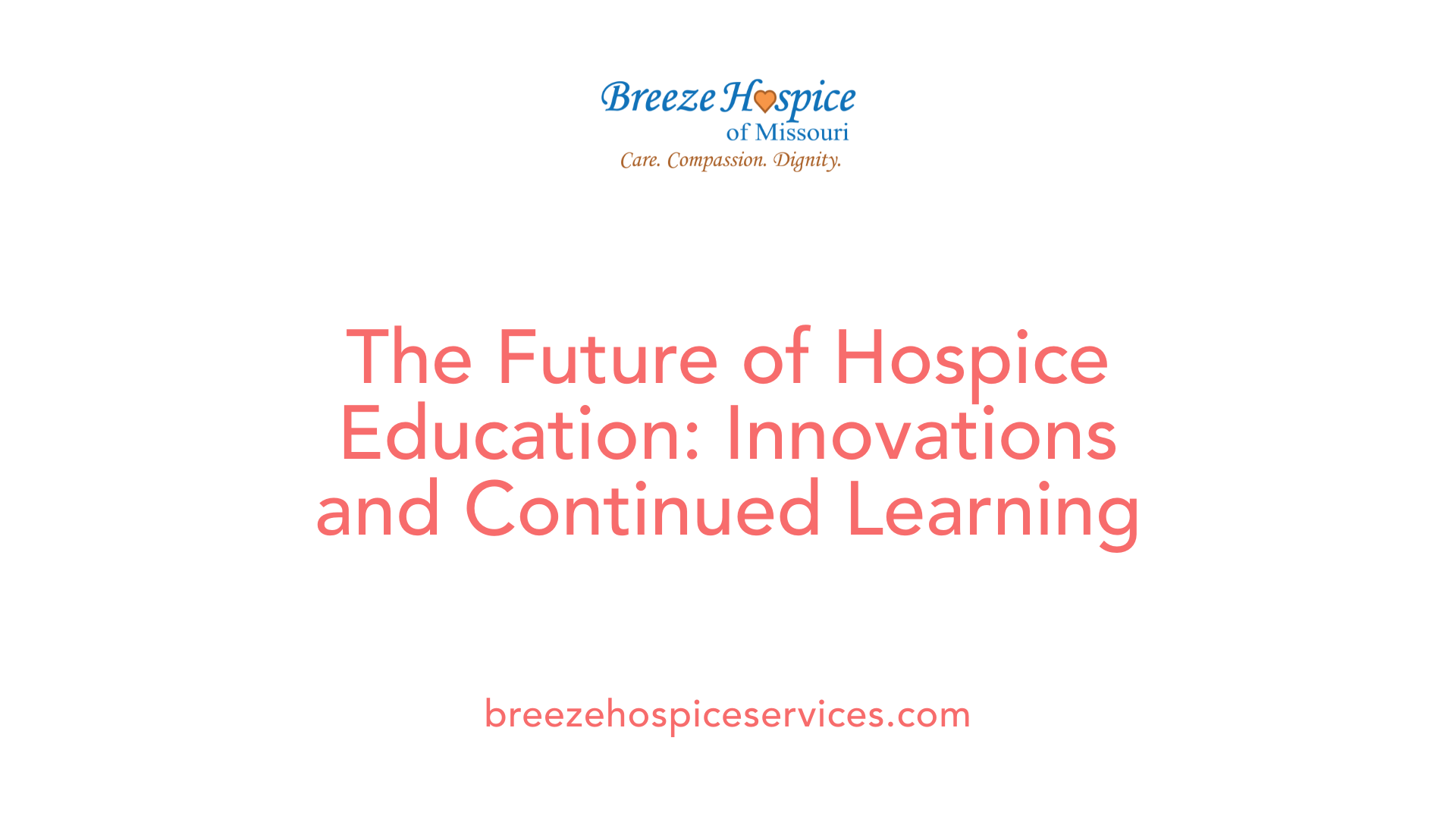 The landscape of hospice education is rapidly evolving, with a significant shift towards online learning platforms. Webinars and multimedia modules offered by reputable organizations like the MJHS Institute and Care Dimensions provide healthcare professionals with convenient, comprehensive, and up-to-date resources. These tools support continuous professional development, enhance clinical skills, and foster better patient care.
The landscape of hospice education is rapidly evolving, with a significant shift towards online learning platforms. Webinars and multimedia modules offered by reputable organizations like the MJHS Institute and Care Dimensions provide healthcare professionals with convenient, comprehensive, and up-to-date resources. These tools support continuous professional development, enhance clinical skills, and foster better patient care.
Expanding access to diverse educational materials, including expert-led webinars, downloadable factsheets, and on-demand courses, is making hospice and palliative care training more inclusive and accessible across different regions and professional disciplines. This broadened access ensures that a wider range of care providers, from nurses and social workers to physicians and administrators, can stay informed about the latest developments.
Looking ahead, the integration of innovative approaches such as virtual reality, artificial intelligence for prognosis, and interdisciplinary collaboration will further enrich hospice education. As the sector embraces these advancements, the focus remains clear: to improve care quality, promote professional growth, and adapt to the evolving needs of patients and families in hospice settings. Continued investment in online education resources will be essential for building a skilled, knowledgeable workforce dedicated to compassionate end-of-life care.
Advancing Compassionate Care Through Continuous Learning
As hospice and palliative care continue to evolve, the importance of ongoing education through webinars, workshops, and multimedia tools remains paramount. These resources enable healthcare professionals and caregivers to stay current with the latest practices, regulations, and innovative approaches. By engaging with expert-led webinars and participating in professional development opportunities, providers can enhance their skills, improve patient support, and uphold the dignity and quality of life for individuals at the end of their journey. The future of hospice education is bright, with expanding access and diverse offerings paving the way for more compassionate and effective end-of-life care.
References
- Hospice & Palliative Care Online Continuing Education
- Hospice & Home Care Webinar Network - Hospice Online Training
- Webinars - National Alliance for Care at Home
- Upcoming Courses Archives - Hospice Foundation of America
- Webinars: Earn CE/CME Credits for Training in End-of-Life Care
- Education - National Alliance for Care at Home
- Hospice & Palliative Care Online Continuing Education | MJHS ...
- Webinars Hospice and Home Care - - Kokua Mau
- Professional Webinar Series - Care Dimensions



































































































